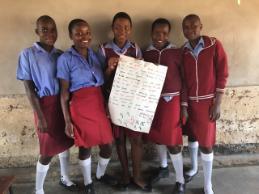
Research project changes approach in face of COVID-19
For the past three years, members of the Centre for International Development and Training (CIDT) at the University of Wolverhampton have been undertaking a study to look into the drop-out rate of school children in Zimbabwe.
The project was due to have its last data collection take place between May and June of this year. However, COVID-19 put a hurdle in the way as schools in the country were shut following lockdown measures being implemented in early April.
The study is tracking over 3,000 students through interviewing the children, their teachers and care givers at strategic intervals over the four-year-project. This year the team were faced with the challenge of how to gather data from this quantity of people during a time of social distancing and facing the inability to travel internationally.
Postponing the interviews would look inevitable, however, the ultimate goal of the study was to advocate for changes in government policy. The Zimbabwe government is currently developing its National Development Plan for 2021-2025 and the Ministry of Education (the MoPSE) will also be developing an Education Sector Strategy Plan for 2021-2025; both to be completed by the end of the year. Therefore, UNICEF and the Ministry were keen that a number of emerging findings and recommendations from the study should feed into these policy documents. CIDT therefore needed to complete and publish the final report by the end of October as originally scheduled.
Interviews for quantitative data collection with headteachers and caregivers began by telephone. As schools were still not opening in Zimbabwe, a tracking process was used to verify the telephone contact details of over 2,000 learners and their primary care givers so they could also be involved in telephone interviews. This proved to be very successful with students finding space and sharing devices with other students to enable them to participate.
Project Team Leader Mary Surridge said: “With the endline back on track, the past three months have highlighted the need to be highly creative and adaptive.
“The pandemic situation has continued to shift and change. Working in very close contact with the Ministry of Education and UNICEF has helped to keep all parties up-to-speed, and promoted the understanding that we are swimming in unchartered waters while still working towards deadlines that had to be met, to align with wider national priorities.”
The endline report will focus on telling the individual stories of students, melding the quantitative and qualitative data collected to reveal the most important factors that lead to school survival or dropout. There will be a focus on the gendered aspects of survival and dropout, as well as the influence of the family and even the impact of COVID-19.
The results from this research could have an impact on various educational issues in Zimbabwe, such as entitlement to state funded education, school fees, behaviour management and discipline and resources for learners with disabilities.
Visit our research pages to find out more about the research taking place at University of Wolverhampton.
For more information please contact the Corporate Communications Team.


/prod01/wlvacuk/media/departments/digital-content-and-communications/images-18-19/iStock-163641275.jpg)
/prod01/wlvacuk/media/departments/digital-content-and-communications/images-2024/250630-SciFest-1-group-photo-resized-800x450.png)
/prod01/wlvacuk/media/departments/digital-content-and-communications/images-18-19/210818-Iza-and-Mattia-Resized.jpg)
/prod01/wlvacuk/media/departments/digital-content-and-communications/images/Maria-Serria-(teaser-image).jpg)
/prod01/wlvacuk/media/departments/digital-content-and-communications/images-2024/241014-Cyber4ME-Project-Resized.jpg)
/prod01/wlvacuk/media/departments/digital-content-and-communications/images-18-19/210705-bric_LAND_ATTIC_v2_resized.jpg)


